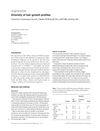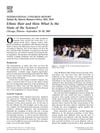 13 citations,
January 2020 in “Scientific Reports”
13 citations,
January 2020 in “Scientific Reports” The African spiny mouse heals skin without scarring due to different protein activity compared to the common house mouse, which heals with scarring.
 7 citations,
March 2019 in “Journal of cosmetic dermatology”
7 citations,
March 2019 in “Journal of cosmetic dermatology” African hair has the most lipids, while Caucasian hair is more hydrated and stronger.
1 citations,
November 2012 in “International Journal of Dermatology” L'Oréal's research and workshops have advanced understanding and tailored cosmetics for African hair and skin.
[object Object]  September 2018 in “Fertility and Sterility”
September 2018 in “Fertility and Sterility” African American women have a higher risk of preterm delivery than Caucasian women, and inflammatory stimuli affect gene expression in cells related to PCOS, showing a heightened inflammatory state in women with PCOS.
 March 2012 in “Journal of the American Academy of Dermatology”
March 2012 in “Journal of the American Academy of Dermatology” African Americans lack knowledge about laser hair removal safety, Nd:Yag laser treatment is effective with high satisfaction, pressure during surgery can cause hair loss, and treating ovarian inflammation may help with alopecia areata.
239 citations,
September 1996 in “The journal of alternative and complementary medicine/Journal of alternative and complementary medicine” Traditional African medicinal plants should be scientifically tested and integrated into modern healthcare.
 88 citations,
April 2011 in “Archives of Dermatology”
88 citations,
April 2011 in “Archives of Dermatology” Type 2 diabetes, bacterial scalp infections, and tight hairstyles like braids and weaves are linked to a higher risk of a scarring hair loss condition in African American women.
 73 citations,
June 2003 in “Journal of the American Academy of Dermatology”
73 citations,
June 2003 in “Journal of the American Academy of Dermatology” Dermatologists need to understand African American hair-care practices to better treat their hair and scalp disorders.
27 citations,
October 2003 in “Dermatologic Clinics” Certain hair care practices in African American girls can lead to scalp and hair issues.
13 citations,
August 2013 in “International Journal of Dermatology” Frontal fibrosing alopecia can affect African men and may be underdiagnosed.
 September 2018 in “Journal of the American Academy of Dermatology”
September 2018 in “Journal of the American Academy of Dermatology” Elderly patients with CCCA were all African American with low vitamin D, but no iron or zinc deficiencies, and no hormonal imbalances compared to younger patients.
 May 2019 in “Journal of the Dermatology Nurses’ Association”
May 2019 in “Journal of the Dermatology Nurses’ Association” Folliculitis decalvans mainly affects middle-aged African American men and is treated with antibiotics.
96 citations,
February 2002 in “Journal of the American Academy of Dermatology” Pseudofolliculitis barbae is a chronic skin condition affecting mainly African American and Hispanic individuals, caused by shaving tightly curled hair, and managed by prevention and treatment but not curable.
 46 citations,
July 2008 in “Dermatologic Therapy”
46 citations,
July 2008 in “Dermatologic Therapy” A scale was made to measure hair loss severity in African American women.
[object Object] 13 citations,
October 2006 in “Pediatrics in review” Early puberty is more common in girls and African-American children, possibly due to nutrition, obesity, stress, and environmental factors, and is treated with hormone therapy.
 September 2021 in “CRC Press eBooks”
September 2021 in “CRC Press eBooks” CCCA is a common hair loss condition in African American women, often inherited and influenced by hairstyling, with unique scalp features detectable by special tools.
 115 citations,
September 2005 in “International Journal of Dermatology”
115 citations,
September 2005 in “International Journal of Dermatology” Different ethnic groups have unique hair growth patterns, with African hair growing slower and less dense, Asian hair growing fast but sparse, and Caucasian hair being densest; men are more likely to experience hair loss than women.
54 citations,
April 2011 in “Journal of Multidisciplinary Healthcare” SLE patients often face depression and anxiety due to physical changes, with African-American and Hispanic patients having higher unmet psychological needs.
 54 citations,
September 2000 in “Archives of dermatology”
54 citations,
September 2000 in “Archives of dermatology” A hair-straightening product caused widespread hair loss and scalp injuries, mainly affecting African American women.
 13 citations,
June 2021 in “Carcinogenesis”
13 citations,
June 2021 in “Carcinogenesis” Certain hair straighteners and dyes may increase ovarian cancer risk, especially in African American/Black women.
 1 citations,
August 2013 in “Journal of the National Cancer Institute”
1 citations,
August 2013 in “Journal of the National Cancer Institute” Early hair loss may increase the risk of prostate cancer, especially in African American men and those with frontal baldness.
September 2021 in “CRC Press eBooks” Dissecting cellulitis of the scalp is a condition that causes inflammation and scarring on the scalp, mainly affecting African-American men, and can lead to permanent hair loss.
 13 citations,
April 2018 in “Journal of The American Academy of Dermatology”
13 citations,
April 2018 in “Journal of The American Academy of Dermatology” People with certain types of hair loss, especially lichen planopilaris and telogen effluvium, as well as African Americans, Asians, and men, are more likely to have severe vitamin D deficiency.
 13 citations,
December 2012 in “Frontiers in bioscience”
13 citations,
December 2012 in “Frontiers in bioscience” Vitamin D and estrogen may help protect heart and kidney health, and maintaining sufficient vitamin D levels could be especially beneficial for African Americans, postmenopausal women, and people with chronic kidney disease.
99 citations,
July 2005 in “Ultramicroscopy” The research improved understanding of hair and skin properties across different ethnicities and conditions.
97 citations,
January 2005 in “Wear” Human hair and skin friction vary by ethnicity, hair type, and environmental conditions.
51 citations,
March 2001 in “Clinics in dermatology” Bleaching damages hair, making it rougher and weaker.
12 citations,
July 2015 in “British journal of dermatology/British journal of dermatology, Supplement” Curly hair breaks due to mechanical damage and environmental factors, not chemical makeup, and needs ongoing care to prevent breakage.
2 citations,
May 2004 in “SKINmed/Skinmed” Proper shaving techniques and treatments can help prevent and manage ingrown hairs and inflammation in people with curly hair.
 2 citations,
May 2002 in “Clinics in Dermatology”
2 citations,
May 2002 in “Clinics in Dermatology” Ethnic differences in hair and skin are significant and under-researched, requiring tailored dermatologic treatments and more study.
















